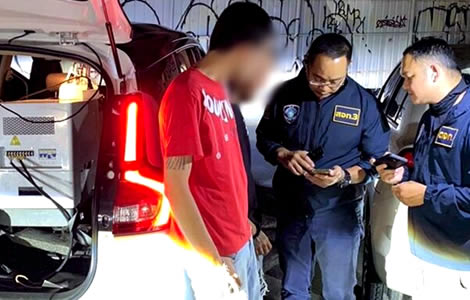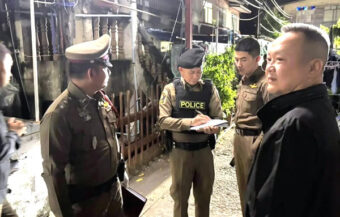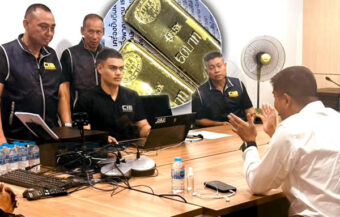Thai police arrest two men driving Bangkok streets with mobile base stations for a Chinese-led cyber gang, blasting thousands of fake bank SMS messages to steal victims’ login details and drain accounts in one of the city’s boldest scams yet.
Chinese scammers struck at the heart of Bangkok on Saturday but found the Royal Thai Police waiting for them. The Cyber Crime Investigation Bureau (CCIB) arrested two Thai men caught driving around the city. Their mission: operate hidden mini transmitters that blasted fake SMS messages to thousands of mobile phones. The texts impersonated banks, tricking victims into handing over login details. Accounts were emptied within minutes. The scale was shocking, the method brazen. Cybercrime in its most ruthless form, organised by Chinese scam networks using Thai contractors and played out on the capital’s streets.

Thai cyber police arrested two Thai men on Saturday, linked to a Chinese-led mobile phishing ring. The men were caught driving a car equipped with a fake base station (FBS) used to send fake SMS messages containing phishing links. These messages were designed to steal money from unsuspecting victims’ bank accounts.
According to investigators, the suspects drove through crowded districts of Bangkok while blasting out fraudulent text messages. Their car acted as a roaming scam machine. Thousands of residents received SMS messages that appeared to come from trusted sources like banks and government agencies.
Chinese-led phishing gang used mobile base station to send fake bank messages across Bangkok
However, the links embedded in those texts led to fake websites. Once victims clicked and entered their personal data, the gang stole their money directly from their accounts. Because of the wide reach and mobile nature of the scam, officials say the damage could involve hundreds of victims.
The suspects, Nopparat Wetchakama, 25, and Mangkon Fuku, 23, were arrested during Operation Khao San. This joint crackdown involved the Cyber Crime Investigation Bureau (CCIB) and engineers from mobile provider Advanced Info Service (AIS).
Police said they received numerous complaints about strange SMS messages appearing on phones throughout Bangkok. In response, they launched a covert investigation with telecom engineers. Soon, they noticed a pattern of messages moving across specific areas of the city.
Eventually, officers traced the source to a white Suzuki Ertiga driving through Soi Sukhumvit 3. While tailing the car, officers received phishing texts themselves — in real time. This confirmed that the vehicle was actively transmitting the fraudulent messages.
Officers traced mobile SMS signals in real time to identify suspects spreading thousands of fraud links
Officers coordinated with Chanasongkram Police Station to intercept the suspects. They finally stopped the car at a parking lot near the old Government Lottery Office. Inside, they found an illegal telecom setup running in the back seat.
The equipment included a fake base station, Wi-Fi router, a mobile power unit, and a signal amplifier. On the car’s roof, a shark-fin antenna concealed the broadcast hardware.
Investigators said the gear allowed the suspects to impersonate legitimate mobile networks. As a result, nearby phones received scam messages as if from real mobile towers. The setup didn’t use standard mobile networks, making it invisible to usual monitoring systems.
During questioning, Nopparat admitted he was hired by a Chinese national. He claimed he was introduced to the operation by a Cambodian waiter, a former co-worker from Khao San Road’s nightlife scene.
Suspect revealed he was recruited by Chinese handler and trained to use a mobile phishing setup in capital
The Chinese handler reportedly mailed him a full kit: a battery, base station, antenna, router, and setup instructions. He also sent a ฿2,000 deposit to secure the deal. Then, he trained Nopparat remotely and gave him orders to drive around and transmit fake messages.
Initially, Nopparat used his personal car. He was paid between ฿3,300 and ฿3,500 per day. He sent between 5,000 and 10,000 phishing messages daily. These texts mimicked official messages from banks, e-commerce sites, and government agencies.
However, the scam’s logistics later changed. The Chinese ringleader switched to using rental cars and reduced wages to ฿1,350 per day. This change aimed to reduce risks and hide connections between the equipment and the suspects.
Although the job was supposed to be long-term, the duo was arrested shortly after starting this phase. Police seized the equipment and are now analysing it for further leads.
Chinese-led scam gang paid Thai drivers daily to send tens of thousands of fake banking messages in Bangkok
Pol. Lt. Gen. Trirong Phiwpaen, TCSD Commander, confirmed that the scam used FBS devices to hijack trusted communication formats. These devices mimic legitimate corporate SMS messages. Therefore, victims are tricked into thinking the links are real.
“Any SMS with a link should immediately raise red flags,” he warned. “Do not click. Instead, check with the organisation directly.”
Pol. Maj. Gen. Chatchaphanthakan Klaiklueng, head of TCSD Division 3, explained that the messages looked almost identical to those sent by real banks. That’s because the criminals captured actual messages previously sent to other victims. Then, they duplicated the formatting.
Once the user clicked, the fake websites collected credentials like usernames, passwords, and OTP codes. The scam operated in real time. While the victim entered details, the gang drained funds from their accounts.
Fraudsters used fake sites and copied bank messages to steal credentials from victims in real time
Pol. Col. Adhichart Amornpradit, Superintendent of News Analysis, stated the team worked closely with AIS engineers. They tracked message signals across Bangkok until they zeroed in on the moving vehicle.
AIS Corporate Relations Manager Mr. Wisitsak Charoenchai added that such messages don’t pass through standard mobile networks. Because of that, they bypass network filters and monitoring tools. He stressed the importance of public awareness. “Technology helps, but caution is the best defence,” he said.
He assured the public that AIS engineers are actively working with police to combat such threats. However, he also emphasised that mobile phishing gangs are constantly adapting. Their methods evolve faster than traditional prevention tools.
Currently, authorities are hunting for the Chinese mastermind. Police believe he may be connected to previously busted scam networks in Thailand. Some of these gangs operated illegal call centres and international phishing rings.
Authorities pursue Chinese mastermind linked to mobile phishing rings operating across Thailand
Investigators are now examining financial transfers, rental agreements, and digital records to identify the handler’s location. Police are also cooperating with international agencies to extend the investigation beyond Thailand’s borders.
Pol. Maj. Gen. Siriwat Deepo, head of TCSD Division 1, noted that similar FBS devices have been found in other cases linked to transnational crime. Therefore, this case could be part of a larger, coordinated fraud network.
Authorities warn the public to remain alert. Scammers often change tactics quickly. Some now pose as government departments, banks, e-commerce platforms or even delivery services.
Police warn public to stay alert as scammers evolve tactics using fake messages and phishing websites
Messages often include urgent language — for example, “Your account has been suspended” or “Click here to confirm your transaction.” These are designed to create panic and prompt instant action.
Police are also urging victims to come forward. Even if no money was lost, reporting scam attempts helps identify attack patterns.
Scammer in a car with a base station using AIS Bangkok transmitters to send over 1 million SMS texts
Certainly, cybercrime tactics are becoming more mobile, stealthy and widespread. Thai police say this case is a wake-up call. Criminals are no longer hiding in call centres. They are now driving through city streets with mobile hacking stations.
Officials promise to intensify crackdowns and strengthen cross-border cooperation. Meanwhile, the public’s role remains vital. With vigilance, public awareness, and quick reporting, police believe the damage from such scams can be significantly reduced.
Join the Thai News forum, follow Thai Examiner on Facebook here
Receive all our stories as they come out on Telegram here
Follow Thai Examiner here
Further reading:
Scammer in a car with a base station using AIS Bangkok transmitters to send over 1 million SMS texts
Cambodian cybercrime industry run by Chinese criminals could be generating up to 38% of its GDP
Debt and ฿1.7 million loss to scammers drive man to murder his wife and two sons in Samut Prakan
Loan shark arrested in Nonthaburi for bullying a borrower charged an annual interest rate of 730%
Bank of Thailand to tackle household debt in new plan from 2024 which will see higher standards
Politicians skating on thin ice as the economy may not be able to withstand a political stalemate
Debt crisis may be one of the top items on the new cabinet’s agenda as central bank stands ready
Potential hazard lights flashing as kingdom’s auto loans spiral into default with sky-high borrowing


















